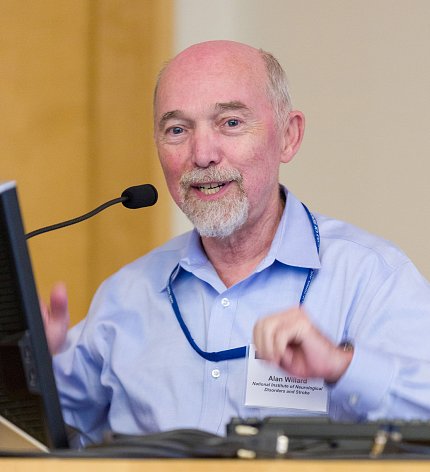NINDS Acting Deputy Director Willard Retires

During a vacation on North Carolina’s Outer Banks in 1997, Dr. Alan Willard, NINDS acting deputy director, spotted a vacancy announcement in Science magazine that said “Come to NINDS and make a difference.” Since joining the institute in 1998, he has taken that message to heart—making a difference, not only at NINDS and NIH, but also within the neuroscience community at large.
On Mar. 31, having well accomplished that charge after 20 years of federal service—almost all with NINDS—Willard officially retired.
“There are very few careers in which one gets to work every day with large numbers of smart, interested, committed people and I know that I am truly fortunate to have had such a career,” said Willard.
“NINDS and indeed many across NIH will sorely miss Dr. Willard’s wisdom, collegiality and good humor,” said Dr. Walter Koroshetz, NINDS director.
Before joining NINDS, Willard was a tenured faculty member at the University of North Carolina at Chapel Hill in the department of cell and molecular physiology and the curriculum in neurobiology, where he pursued research in developmental neurobiology and synaptic physiology. He also served as a director of graduate studies and as a member of the administrative board of the Graduate School at UNC.
Growing up on a dairy farm in Vermont, Willard was always interested in animal physiology and anatomy. However it was not until he entered Yale University that he developed a real fascination for science.
“I had an extraordinarily exciting instructor—Dr. Richard Goldsby—who showed us the joys of biology as an experimental field and from that point on I was hooked,” said Willard.
He earned his undergraduate degree in molecular biophysics and biochemistry from Yale in 1972, and his Ph.D. in biology from the University of California, San Diego, in 1978. Willard did postdoctoral research in the UCSD biology department from 1979 to 1980, and from 1980 to 1983 at Harvard Medical School in the department of neurobiology, where he later became an instructor.
In 1984, Willard left Harvard for UNC, and from there he joined NINDS as scientific review administrator of the NSD-C study section, which reviewed basic, clinical and translational research grant applications in the areas of epilepsy, pain and basic neuroscience.
“I had recently completed a term as the chair of a CSR study section and really enjoyed being involved in the scientific review process, so the idea of becoming an SRA seemed like a natural next step in my career,” Willard explained.
In January 2002, he was asked to serve as acting deputy director of the Division of Extramural Research (in addition to continuing his work as an SRA). This would be the first of 7 times during his NINDS career when he took on a second position while a vacancy was being filled.
In September 2002, he became chief of the Scientific Review Branch, a position he held until January 2011, when he became deputy director of the Division of Extramural Research. He was named acting deputy director of NINDS in 2014.
Throughout his time at NIH, Willard received numerous awards and accolades, including many NIH Director’s Awards, NINDS Merit and Special Act or Service Recognition Awards and several NINDS Merit Awards for Mentoring. He served on countless NIH, trans-NIH and NINDS committees and working groups as well as some outside of NIH.
Among Willard’s most satisfying accomplishments were his collaborations with teams of scientific review officers to identify reviewers from diverse scientific backgrounds and then helping them work together to evaluate large numbers of new and complex types of applications. Especially memorable examples included a trans-NIH request for applications for centers of excellence on translational human stem cell research (prior to the development of induced pluripotent stem cell technology), a huge volume of American Recovery and Reinvestment Act of 2009 initiatives, the first Exceptional Unconventional Research Enabling Knowledge Acceleration (EUREKA) in neuroscience grant reviews and the first rounds of NIH Pathway to Independence Award (K99/R00) reviews.
During 2008 and 2009, Willard served as the “integrator” of a set of three large teams of NIH staff who implemented significant changes to the NIH peer review process.
Known for his wit and for always having a joke at the ready, Willard acknowledged that he will miss his colleagues, coworkers and the researchers NINDS supports. However, the more administrative aspects of his job, like performance reviews and travel justifications, he will not miss as much.
“I very seriously doubt that I will ever wake up one morning and say, ‘Gee, I really have a burning desire to write lengthy justifications for our scientists to attend professional meetings,’” Willard quipped.
In retirement, he plans to travel and spend time pursuing his passion for hiking and backpacking in remote locations. He is most looking forward to an extended trip to New Zealand and Australia with his 90-year-old mother, who shares his love of exploring the outdoors.
“One of the things I have enjoyed most during my career, both as a faculty member at UNC and as an NIH employee, is sharing the excitement of scientific discovery with members of the public,” Willard concluded. “During my time at NIH, I have had the opportunity to learn about enormous numbers of exciting discoveries. I believe strongly that it is important to help members of the public appreciate how many amazing and important projects their tax dollars support, so whenever I am traveling, I always make a point of telling the people I meet about the remarkable range of projects that NIH supports. I intend to continue to be an enthusiastic champion for science in general and for NIH in particular.”
